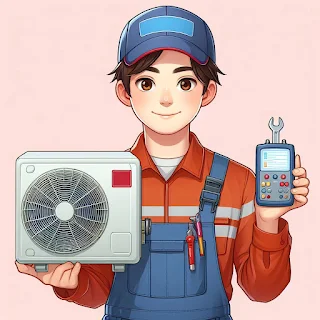Air Conditioning Technician Career Guide
1. Career Path for AC Technicians: A Step-by-Step Guide
Air conditioning technicians are responsible for installing, maintaining, and repairing residential and commercial air conditioning systems. The typical career path involves the following steps:

- Earn a high school diploma or GED.
- Complete a formal training program in air conditioning, heating, ventilation, and refrigeration (HVAC/R).
- Gain practical experience through an apprenticeship or entry-level position in the air conditioning industry.
- Obtain the necessary licenses and certifications required in your state or locality to work as an AC technician.
- Explore opportunities for specialization, such as in residential or commercial AC systems, or in specific areas like refrigeration or solar heating.
- Pursue advanced certifications or training to enhance your skills and increase your earning potential.
2. Qualifications for Becoming an AC Technician: Education and Skills Required
Education:
- High school diploma or GED
- Completion of an HVAC/R training program (certificate, diploma, or associate's degree)
Essential Skills:
- Knowledge of air conditioning systems, components, and principles
- Proficiency in using tools and diagnostic equipment
- Strong problem-solving and troubleshooting abilities
- Attention to detail and ability to follow technical manuals and blueprints
- Physical strength and stamina for working in tight spaces and handling heavy equipment
- Excellent customer service and communication skills
- Basic math and reading comprehension skills
3. AC Technician Salary Trends: What to Expect in This Career
According to the U.S. Bureau of Labor Statistics, the median annual salary for HVAC technicians, which includes air conditioning technicians, was $48,630 in 2021. However, salaries can vary based on factors such as experience, education, industry, and geographic location. Generally, AC technicians working in metropolitan areas, specialized fields, or union jobs tend to earn higher salaries.
4. Top Books for Aspiring AC Technicians: Resources to Get Started
- "Refrigeration and Air Conditioning Technology" by Bill Whitman, Bill Johnson, and John Tomczyk (Link)
- "Modern Refrigeration and Air Conditioning" by Andrew D. Althouse, Carl H. Turnquist, and Alfred F. Bracciano (Link)
- "HVAC Controls and Systems" by John Bamborough (Link)
- "Residential Air Conditioning and Heating" by Eugene Silberstein (Link)
5. Essential Syllabus and Topics for AC Technicians: What You Need to Learn
A typical air conditioning training program or curriculum may cover the following topics:
- Fundamentals of thermodynamics, heat transfer, and fluid flow
- Refrigeration systems and components
- Air conditioning systems (split systems, packaged units, chillers, etc.)
- Ductwork and air distribution systems
- Electrical theory and controls
- AC system design and installation
- Troubleshooting and repair techniques
- Safety practices and environmental regulations
- Blueprint reading and technical documentation
6. How to Become an AC Technician: A Comprehensive Guide
For detailed information on becoming an AC technician, you can refer to the following resources:
- U.S. Bureau of Labor Statistics: Heating, Air Conditioning, and Refrigeration Mechanics and Installers
- HVACClasses.org: How to Become an HVAC Technician
- ESCO Group: Starting a Career in HVAC
7. Best AC Technician Programs, Certifications, and Colleges: Where to Study
- Certificate and diploma programs in HVAC/R are offered at technical and vocational schools, such as Remington College (Link) and Lincoln Tech (Link).
- Associate's degree programs in HVAC/R technology are available at community colleges like San Jacinto College (Link) and Tri-County Technical College (Link).
- The Environmental Protection Agency (EPA) offers certifications for handling refrigerants (Link).
- The Air Conditioning Contractors of America (ACCA) provides various HVAC/R certifications and professional credentials (Link).
8. Applying for Jobs as an AC Technician: Tips and Strategies to Get Hired
- Highlight your air conditioning training, certifications, and any relevant hands-on experience in your resume.
- Obtain the necessary licenses and certifications required in your state or locality to work as an AC technician.
- Develop a strong network within the HVAC/R industry by attending job fairs, joining professional organizations like ACCA, and connecting with professionals on LinkedIn.
- Tailor your resume and cover letter to the specific job requirements and emphasize your technical skills, problem-solving abilities, and customer service experience.
- Be prepared to undergo background checks and drug screenings, as many AC employers have strict hiring policies.
- Consider starting in entry-level positions or apprenticeships to gain practical experience before pursuing more advanced roles.
By following these steps and utilizing the provided resources, you can gain a comprehensive understanding of what it takes to pursue a rewarding career as an air conditioning technician.